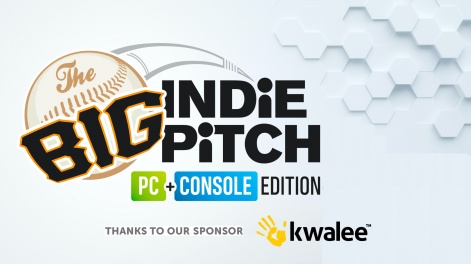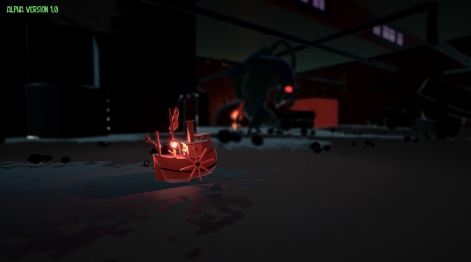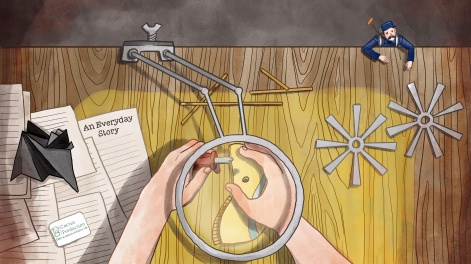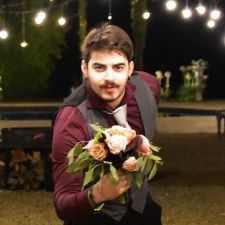The Big Indie Pitch is a regular event run by the makers of Pocket Gamer and PC Games Insider. It sees indie developers engage in a speed-dating-styled pitching competition for fame and those sweet, sweet promotional packages.
The event gives indies five minutes to pitch their games to a panel of press, publishers and industry pundits. The judges then pick three winners and everybody gets valuable feedback.
The indie view
The Big Indie Pitch is getting bigger and bigger as we bring it to events all across the world. To give you an idea of what the event is like, who attends the events and the games on show, we've sat down with a number of past Big Indie Pitch contestants to offer their views.
Today, we're speaking to Roberto Vergine from Cactus Production, who submitted An Everyday Story to The Digital Big Indie Pitch (PC+Console Edition) #11 sponsored by our season sponsors Kwalee, and walked away as the third place runner-up.

Sophia Aubrey Drake: Tell us a little about yourself and your indie studio - who is on the team, and what are their inspirations?
Roberto Vergine: I'm Roberto Vergine, an aspiring "Kojima" likes designer from Italy, but I gotta start small. To achieve this, I have started two indie studios and started building my career and experiences. Now, in January 2022, it has been one year since I started prototyping my game, An Everyday Story after being rejected by Ubisoft for a designer opportunity.
“When life shuts down the door, you have to build one from yourself and open it to others.”
Here's when I contacted one of my oldest friends, Alessio, and while he was working on his exams in psychology, I got to show him my ideas, hoping I would have managed to involve him in the screenwriting of the game. Fun fact: he thought this was just a funny experience, while I was thinking big, and here we are again, working stronger than ever.
The others team members shifted a bit during the development because of studies matters or distance. Now, we are eight people plus one external member:
- Alessio Oliva - The mastermind behind the emotional story he crafted for the game
- Francesco Zarbà - Another close friend of mine who never let me down during exams in the academy and a monstrous 3d artist
- Noemi Pizzolorusso - Another colleague of mine during my studies who trusted me when I contacted her with just an idea
- Rodrigo Noales - This was my lucky ticket for 2021. I found him through a random post on Reddit, he is a Web designer but a majestic composer by heart. He lives in Argentina but I would never thank him enough for believing in an idea from some random guy across the ocean.
- Riccardo Vacca - The creator of the logo for the studio and another brilliant mind from Rome
- Irene Mussi - Our intern who brings to life the ideas with fantastic concept arts
- Luca Larcher - Another intern who helps me with my potato coding skill and bring magic to the game
- Miriam Barbieri - She is helping us with the cutscenes and her style is simply charming
- Roberto Vergine - World's best boss, someone would say
Tell us about An Everyday Story that you pitched at the competition.
An Everyday Story is a 3D Horizontal Story-Driven Platform game about a man who goes through his life memories very unusually. The player will revisit the man's experiences from the perspectives of three little trinkets he kept dear, adding irrational elements. These trinkets are toys he was gifted by someone he loved or gifted by him to a dear one.
Therefore they function as a memento of his sliding doors. You'll be able to witness both the highlights and lowlights of his life, from his childhood until his last breath. We could say that it’s an Evening type of experience more focused on memories and how each player uses everyday objects to remember moments of their life.
What do you think are the most unique and interesting aspects of An Everyday Story that gamers may never have seen before.
I think the fact you are playing like a little toy and are tied to your size and limitations is one of the key aspects of the game. We can’t compare it to game likes It Takes Two or Unravel in terms of Gameplay and complexity, but we are constantly looking for puzzles and situation in which the limitation itself become part of the story and the progression. The second one is certainly the Oniric Sections, in which the player expand one peculiar moment and is tied to the memory. They are sudden and unique, but they grant a fun section entwined to the backstory of the characters.
An Everyday Story is an emotionally charged narrative-driven adventure. What made you choose to make this type of game, and what do you think you bring to it that may not have been seen before?
If you take a look at the Indie market, you will immediately notice one recurrent aspect: melancholy, strong emotions and thematics that big software houses often ignore for more safe narrative approaches.
I wanted to create something that could reach the heart of the player because that’s what I want: an ordinary story written by ordinary people because they are the more sincere and empathic ones.
We tried to explore a different approach from which the story is presented through the three trinkets and a more naive one mixing reality and dreams like if the main protagonist has kept his childhood vision even when he’s an adult man.

How did you come to choose the platforms that you would develop An Everyday Story for?
PC was, obviously, the first choice because of its simplicity in terms of release and market, even if it is harder to shine due to the enormous amount of titles being published every day. Consoles would be a big hit, but due to the contained length of the game, it will be hard to get into them.
I had an interesting meeting with Nintendo and I think our game could reach a wider audience on Switch than on pc, but I am waiting for the game to be in a later stage to propose it (if someone from Nintendo is reading, be ready because we are coming with a great game).
The mobile one was never on our plan because we want the player to experience it in a space without distraction and where they could dive into the narrative and taste the music to its fullest.
Looking at the studio a little more now. How hard is it to survive as an Indie developer?
I have given a few talks about this topic, such as this one.
In a few words, I can assure you it’s not easy at all. Firstly because of the time you have to spend taking care of all the aspects of the development while you are working on it every day, no matter the hour. Secondly, because you have to invest money to afford plugins and external resources, and if you don’t start with a large budget, which in our case, you find yourself working in three places at the same time, and it surely requires some guts to do this. Lastly, you are trying to contact the publisher to events, pitching the game hundreds of times during the year, even to the same ones in order to show them some progress. It’s hard and nothing can change it, but when you reach a milestone, publishers give you a lot of compliments about the game and to you as a person, you win competitions, you can feel the warmth of the success, and it’s beautiful to share it with your team.
Are there any tips and advice you would give to an independent developer out there who are just starting out?
Just one. Are you sure you have what it takes to become an indie dev? If the answer is yes, then please, dream high but start creating something small but unique as a snowflake.

How did you find your experience pitching as a part of the Big Indie Pitch?
It is always difficult to convince people your game is worthy of some recognition in just five minutes, but it surely helps you to become more confident about your idea and to gain experience presenting it to others.
What do you feel you have gained from the experience, and what do you still hope to gain?
I have gained something unique: the possibility to share recognition with my team to make them proud of the trust they are giving me.
This is a sign our idea works and that we could achieve some results in the wild market out there, and we want it all. I am looking forward to the next pitches, but I’ll be waiting a few months before them because I want to share even more progress and make the judges eyes little sparkling stars.
What are your hopes for this game in the future, and do you have any plans for any future projects?
Our main objective is to release it during this year so that every team member can share it with the world and add it to their portfolio. This will assure us that we can make games and players are interested in our stories so that the next one could be something not from everyday ones.
Want to show off your exciting new game? We host Big Indie Pitch events throughout the year, so be sure to keep an eye out on our events page for an event near you, or even our new Digital pitches.
All our upcoming pitches including how to enter can be found over on our upcoming events page on BigIndiePitch.com.
Get the latest news, interviews and in-depth analysis on Twitter, Facebook, and our daily newsletter.
















